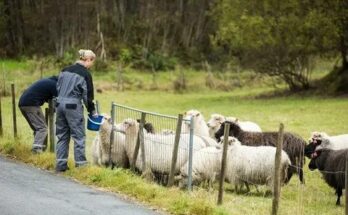Farm Jobs in Canada
Canada, known for its breathtaking landscapes, high standard of living, and abundant job opportunities, is increasingly becoming a top destination for individuals seeking stable and rewarding employment. Among the many sectors offering jobs, the agricultural industry stands out as a vital part of Canada’s economy. Farm jobs in Canada are not only in high demand but also provide an excellent pathway for skilled and semi-skilled workers to build a prosperous future. Whether you’re a local resident or an international worker, this blog will explore everything you need to know about farm jobs in Canada, including the types of jobs available, eligibility requirements, benefits, and how to apply.
Why Farm Jobs in Canada Are in High Demand
Canada is one of the world’s largest agricultural producers, contributing significantly to the global food supply. The country’s vast farmlands, advanced farming techniques, and diverse crops create a constant need for skilled and hardworking individuals. Here are some reasons why farm jobs are in high demand:
- Labor Shortages: Many rural areas in Canada face labor shortages, especially during peak farming seasons like planting and harvesting.
- Seasonal Work: Farming is often seasonal, requiring additional workers during specific times of the year.
- Global Food Demand: As the global population grows, the demand for food production increases, making farm jobs essential.
- Government Support: The Canadian government actively supports the agricultural sector through programs and policies that encourage employment in this industry.
Types of Farm Jobs in Canada
Farm jobs in Canada are diverse and cater to a wide range of skills and experience levels. Here are some of the most common types of farm jobs available:
1. Farm Workers
Farm workers are the backbone of the agricultural industry. Their responsibilities include planting, harvesting, irrigating, and maintaining crops. This role is ideal for individuals who enjoy physical work and being outdoors.
2. Livestock Workers
Livestock workers care for animals on farms, including feeding, milking, and monitoring their health. This role is perfect for those with experience in animal husbandry or a passion for working with animals.
3. Farm Equipment Operators
Modern farming relies heavily on machinery. Equipment operators handle tractors, harvesters, and other machinery to plow fields, plant seeds, and harvest crops. Training or experience in operating heavy machinery is often required.
4. Supervisors and Managers
Experienced individuals can take on supervisory or managerial roles, overseeing farm operations, managing workers, and ensuring productivity. These positions often require prior experience in agriculture or management.
5. Greenhouse Workers
Greenhouse workers specialize in growing plants, flowers, and vegetables in controlled environments. This role is ideal for those interested in horticulture or sustainable farming practices.
6. Agricultural Technicians
Agricultural technicians assist in research and development, testing soil, monitoring crop health, and implementing new farming technologies. This role is suited for individuals with a background in agriculture or science.
Benefits of Working in Farm Jobs in Canada
Farm jobs in Canada offer numerous benefits, making them an attractive option for both locals and international workers. Here are some of the key advantages:
1. Competitive Salaries
Farm jobs in Canada offer competitive wages, often higher than those in many other countries. Additionally, overtime pay is common during peak seasons.
2. Work Permit Opportunities
Canada’s Temporary Foreign Worker Program (TFWP) and Seasonal Agricultural Worker Program (SAWP) allow international workers to obtain work permits for farm jobs. These programs provide a pathway to gain valuable work experience in Canada.
3. Pathway to Permanent Residency
For those looking to settle in Canada, farm work can be a stepping stone to permanent residency. Programs like the Agri-Food Pilot encourage workers in the agricultural sector to apply for permanent residency.
4. Skill Development
Working on a farm allows individuals to develop a wide range of skills, from operating machinery to managing crops and livestock. These skills are transferable and can open doors to other opportunities.
5. Work-Life Balance
Many farm jobs offer a healthy work-life balance, with opportunities to work outdoors and enjoy the natural beauty of Canada’s countryside.
Eligibility Requirements for Farm Jobs in Canada
To work in farm jobs in Canada, certain eligibility criteria must be met. These requirements vary depending on whether you are a Canadian resident or an international worker.
For Canadian Residents:
- A valid Social Insurance Number (SIN).
- Physical fitness and ability to perform manual labor.
- Relevant experience or training (for specialized roles).
For International Workers:
- A valid job offer from a Canadian employer.
- A work permit obtained through programs like TFWP or SAWP.
- Proof of qualifications or experience (if required).
- Medical clearance and a clean criminal record.
How to Apply for Farm Jobs in Canada
Applying for farm jobs in Canada is a straightforward process. Here’s a step-by-step guide to help you get started:
1. Research Job Opportunities
Start by researching available farm jobs in Canada. Websites like Job Bank, Indeed, and AgCareers are excellent resources.
2. Prepare Your Resume
Create a professional resume highlighting your skills, experience, and qualifications. Tailor your resume to the specific job you’re applying for.
3. Apply for Jobs
Submit your application through the employer’s website or job portal. Ensure you include a cover letter explaining why you’re a good fit for the role.
4. Obtain a Work Permit (if applicable)
If you’re an international worker, your employer will need to provide a Labor Market Impact Assessment (LMIA). Once approved, you can apply for a work permit through Immigration, Refugees and Citizenship Canada (IRCC).
5. Prepare for Your Move
Once you’ve secured a job and work permit, start preparing for your move to Canada. Arrange accommodation, transportation, and familiarize yourself with Canadian culture and regulations.
Challenges of Farm Jobs in Canada
While farm jobs in Canada offer numerous benefits, they also come with certain challenges:
- Physical Demands: Farm work can be physically demanding, requiring long hours of manual labor.
- Seasonal Nature: Many farm jobs are seasonal, which may result in periods of unemployment.
- Remote Locations: Farms are often located in rural areas, which may lack the amenities of urban centers.
- Weather Conditions: Workers must be prepared to work in various weather conditions, from extreme heat to cold.
Tips for Success in Farm Jobs
- Stay Physically Fit: Regular exercise and a healthy lifestyle will help you cope with the physical demands of farm work.
- Learn New Skills: Take advantage of training opportunities to enhance your skills and increase your employability.
- Network: Build connections with employers, coworkers, and industry professionals to discover new opportunities.
- Be Adaptable: Farming requires flexibility, so be prepared to adapt to changing conditions and tasks.
Farm Jobs in Canada
Farm jobs in Canada offer a unique opportunity for individuals to build a rewarding career in a thriving industry. With competitive salaries, opportunities for skill development, and pathways to permanent residency, these jobs are an excellent choice for both locals and international workers. While the work can be challenging, the benefits far outweigh the difficulties, making farm jobs a golden opportunity for those willing to put in the effort.
If you’re ready to take the first step toward a brighter future, start exploring farm job opportunities in Canada today. With determination and hard work, you can cultivate not just crops, but also a prosperous and fulfilling life in one of the world’s most welcoming countries.
Note: For more information on farm jobs and work permits, visit the official websites of Job Bank and Immigration, Refugees and Citizenship Canada (IRCC).



